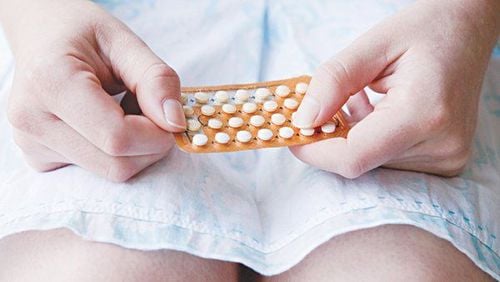This is an automatically translated article.
The article was professionally consulted by Specialist Doctor II Lai Thi Nguyet Hang - Department of Obstetrics and Gynecology - Vinmec Ha Long International General Hospital.Most women after giving birth are recommended by experts to breastfeed their babies to provide essential nutrients for babies. However, some women need to use birth control during this time but do not know how to be both effective and not affect milk production. Follow along with us to follow the article below to answer the above questions.
1. When does conception return after childbirth?
It is difficult to determine exactly when you will get pregnant again after giving birth. However, if your period starts to return (about 6 weeks postpartum), you're likely to get pregnant again. If ovulation occurs, your chances of getting pregnant will be very high. Therefore, you should use safe contraception when you have sex right after giving birth to avoid unwanted pregnancy.2. Contraception while breastfeeding
2.1 Non-hormonal contraceptives
Mothers should use non-hormonal methods of contraception while breastfeeding to avoid affecting milk quality, including the Lactation Amenorrhea Method (LAM), condoms, and IUDs. pregnancy or intrauterine device.
2.1.1 Lactation amenorrhea method (LAM)
Breastfeeding is not only a source of essential nutrients for the development of young children, but also an extremely effective way of birth control. The birth control rate will be 98% successful if you follow this method correctly, because the method is very simple, does not bring side effects, does not cost, does not affect sexual intercourse education and especially bring many benefits to both mother and baby.
In order for LAM to be highly effective, the following conditions must be met:
Exclusive breastfeeding Mothers who have not had their period again within 56 days of giving birth Babies under 6 months of age It is best to breastfeed , you should not use a bottle because when your baby sucks, your body is stimulated to secrete the hormones prolactin, which inhibits FSH and GnRH- which play a role in stimulating maturation and ovulation leading to suppression of ovulation. and no period. You should feed your baby no more than 4 hours at a time during the day and 6 hours at night, or feed when your baby needs it. For children under 6 months, the failure rate is very low (2%), from 6 months and up the rate will increase to over 5%.
However, this is only a temporary method of contraception and has many limitations, mothers need to have a complete and healthy diet.
2.1.2 IUD
Inserting an IUD while breastfeeding is an extremely effective method of contraception and absolutely does not cause any adverse effects on breast milk, so it is very safe for the baby. You only need to put in 1 time and the right time to put in an IUD is as early as 6 weeks postpartum for the uterus to return to normal.2.1.3 Condoms (BCS)

2.2 Hormonal contraceptives
2.2.1 Progestin-only birth control pills (POPs)
It is an oral contraceptive suitable during lactation and does not affect lactation or milk quality. According to WHO recommendations, you should take POPs while breastfeeding after 6 weeks postpartum, that is, when lactation is fully established. When it comes to lactation, low-dose POPs have no effect on the duration of lactation or on the general condition of the infant, with a failure rate within the first year of use being approximately 8%.You need to take them every day at the same time (no more than 3 hours late). If you forget or are more than 3 hours late, you must use backup contraception within 48 hours.
2.2.2 Injectable contraceptive DMPA
Women who are breastfeeding need to wait until after 6 weeks postpartum to have their first DMPA shot. The progesterone-like hormone in these injections is not harmful to mother or baby, so this method is almost completely effective. However, there are a few undesirable side effects when using this method, such as bleeding and weight gain. In particular, young mothers should use caution because it can affect bone density.2.2.3 Implanon contraceptive implant
This is also a suitable choice for mothers because it does not have much effect on breast milk as well as the breastfeeding process. This implant is effective in preventing pregnancy for 3 years. Once the Implanon is inserted, the progestin will be released at regular intervals each day. In Vietnam, this method of contraception is still quite new, so those who are still surprised when accessing it should note the possibility of bleeding in the first few months of use or amenorrhea.2.3 Use of combined oral contraceptives during lactation
Combined oral contraceptives (COCs: Combined Oral Contraceptives) are not recommended to be used during lactation, especially in the early stages because of the estrogen content. However, the contraceptive efficacy of COCs is much higher than that of progestin-only oral contraceptives. Although COCs can reduce milk production, it does not change the composition of milk. The amount of estrogen secreted in breast milk is not harmful to a normal infant, but it should be avoided in premature infants. According to WHO recommendations, breastfeeding mothers should wait after 6 months to take COCs because after this period the baby is able to accept a variety of foods.
3. In case you need permanent contraception
In women over the age of 35, sterilization is the most common and effective method of preventing pregnancy. Sterilization methods for men and women include a vasectomy for men, a tubal ligation for women, and a new option, Essure.In principle, mothers who need contraception during lactation should avoid hormonal contraceptives. However, there are options for hormonal birth control (progestin alone) that do not affect breast milk. Mothers also need to consider between the need for contraception and the need for complete or incomplete breastfeeding, sooner or later to apply appropriate measures for themselves.
The Department of Obstetrics and Gynecology of Vinmec Medical System is satisfied by customers for its service quality and privacy.
A team of highly qualified and experienced doctors: the doctors here are all professors, doctors, specialists I, II, and masters who are well-trained and specialized in hospitals. leading national and international universities. Comprehensive gynecological examination: Provide a variety of gynecological examination packages from pre-marital to post-marital. Customers will receive: Gynecological examination, bilateral breast ultrasound, transvaginal ultrasound of the uterus and ovaries, total urinalysis by automatic machine and test for infertility, syphilis, pre-cancerous cervical cancer screening. Modern equipment system: The most advanced and modern diagnostic and treatment equipment in the world are imported from the US, UK, Germany, Japan and Singapore, on par with leading hospitals. in the area. Ensure patient privacy: Applying a 1:1 medical examination and treatment model (one doctor - one patient), all medical information is analyzed and meticulously evaluated by the doctor after being examined. Absolute security. No separate examination, meeting 5-star standards.
Please dial HOTLINE for more information or register for an appointment HERE. Download MyVinmec app to make appointments faster and to manage your bookings easily.














